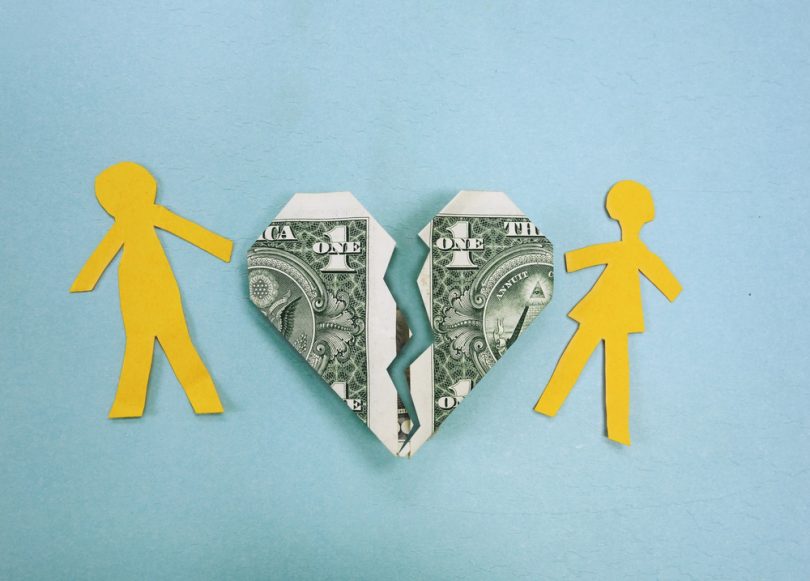When you’re going through the process of divorce, you’re in the mode of dividing up your assets. BUT (and it’s a big but here) you also have to pay attention to the other side of the balance sheet (Yup, that’s the credit/debt side.).
Just like marriage can affect your credit, so can divorce. Here are nine pitfalls to avoid when it comes to your credit and your divorce.
1. Not Being in the Know
You might not even realize all of the accounts that you share or are joint with your soon-to-be ex-spouse. So, probably one of the biggest mistakes you can make is not being in the know.
First thing you should do is pull your credit report and a copy of your spouse’s credit report so you can compile a list of all of your joint credit accounts. You’re going to need to arm yourself with this information so you can monitor the payments on these accounts (to make sure your spouse continues to make the payments he/she is responsible for making) until you close them and that your spouse does not open any new joint accounts/debts.
In a community property state, such as Arizona and Texas, a spouse is responsible for any debt (even individual debt that is incurred during the marriage). If you live in a community property state, you’re going to want to take note of these credit and debt accounts as well.
2. Keeping Joint Accounts Open
Even in the most amicable of divorces things can change—quickly. The day you decide you’re filing for divorce or calling it quits on the relationship, close all of your joint accounts. You don’t want to be responsible for your spouse running up credit card charges or writing checks off your line of credit.
You’re still going to be responsible for making payments on any joint accounts or loans you have with your spouse so closing these accounts curbs any future spending.
If for some reason you cannot close a joint account, talk to the creditor about freezing the account. This is especially true for accounts that have a current balance. Freezing an account prohibits any future charges to the account, but allows you to continue repaying the existing debt.
3. Stop Making Payments on Joint Accounts
You and your spouse are still responsible for making payments on any outstanding balance you have on joint accounts (even the ones you close). Never stop making your payments on these accounts, even if your spouse does, because non-payment and late payments is the quickest way to ruin your credit and watch your credit score plummet.
4. Waiting for the Settlement to Divide Debt
Divorces can be quick and painless or they can be long and brutal. Things might start out friendly so you think, “Oh, I’ll just wait for the divorce settlement to figure out who is responsible for paying which debts.”
This is the wrong answer.
Credit card companies, loan companies, and any other debt companies you share jointly with your spouse aren’t going to say, “Oh, you’re going through a divorce. No problem. You don’t have to pay us back until your divorce is finalized and we know who is responsible for paying the debt.”
Because guess what? You’re both responsible for repaying the debt until the courts divide up the joint accounts and debts.
5. Keeping Bank Accounts in Place
Joint bank accounts are just as dangerous to your credit as joint credit cards and loans. Consult your attorney before you close joint accounts or make any withdrawals from your joint accounts. As soon as he or she advises you on how to handle it, close your joint checking and savings accounts and open accounts in your individual name.
At a minimum, you can start depositing your paychecks and income into your new individual account to manage your bills until the divorce is final.
6. Hanging on to the Family Home (and Mortgage)
If you have kids, you might be hell-bent on keeping the family home. It’s what the kids are used to. Their friends live nearby and their school remains the same. This all sounds good in theory but financially and credit wise, it’s usually not wise to keep an expensive home and mortgage for the kids.
Instead, consider finding a different home in the same or a nearby neighborhood that you can financially afford with your income (including any alimony you might receive in the future). Kids are resilient and pretty flexible so they’ll quickly adjust to a new place and benefit financially in the long run when you can afford the home where you live.
7. Living Status Quo
When you have two incomes and one household to maintain, money stretches a lot further than when there are two households to maintain. You, the kids, and your spouse will likely all have to make a lifestyle change to cut back on spending during the divorce and even after the divorce is final.
Expensive family vacations, swimming and dance classes might have to become a thing of the past or adjustments have to be made to scale back on how much is spent on these items to fit your new financial lifestyle.
8. Not Planning for the Future
Don’t wait for the divorce to be final to plan for your financial future. Create a “single again” budget while you’re going through the divorce. You can start preparing now for the expenses you need to cut back on so you can live within your means when the time comes.
9. Keeping the Spouse as an Authorized User
If you have any credit cards or accounts where you’re the account holder but your spouse is an authorized user, make sure to remove them as an authorized user on the account. This prevents your spouse from running up balances on your accounts that you are then responsible for repaying.
Divorces are hard enough. Don’t let the divorce wreak havoc on your credit and financial situation.




